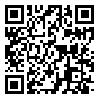Volume 9, Issue 3 (Autumn 2023)
JMIS 2023, 9(3): 266-277 |
Back to browse issues page
Ethics code: 99/11/53/1995
Download citation:
BibTeX | RIS | EndNote | Medlars | ProCite | Reference Manager | RefWorks
Send citation to:



BibTeX | RIS | EndNote | Medlars | ProCite | Reference Manager | RefWorks
Send citation to:
Khosravi R, Lotfi S, Ramezanghorbani N. A Study on the Work Ethic status and Its Associated Factors in Farabi Hospital, Tehran, Iran. JMIS 2023; 9 (3) :266-277
URL: http://jmis.hums.ac.ir/article-1-484-en.html
URL: http://jmis.hums.ac.ir/article-1-484-en.html
Department of Sociology & Social Planning, Faculty of Economics, Management and Social Sciences, Shiraz University, Shiraz, Iran.
Abstract: (2471 Views)
Objective The cultivation of work ethics within the work culture of society can lead to progress and advancement. This study aims to determine the current state of work ethics and the influential factors in Farabi Hospital, Tehran, Iran.
Methods This cross-sectional study was conducted in Farabi Hospital in Tehran, Iran in 2020. Using the census method, all the personnel working in the hospital (n=616) were selected as the study samples. The Occupational Work Ethic Inventory (OWEI) was used to measure the work ethic. Data analysis was done in SPSS software version 20.
Results The mean score of OWEI and its subscale scores were significantly different based on the type of employment, the number of times receiving incentives or rewards, work experience, education level, and socio-economic status of the employees. However, no significant difference was reported in terms of sex, marital status, and income level.
Conclusion For improving the work ethic level and its indicators in Farabi Hospital, the reward system and payments should be modified.
Methods This cross-sectional study was conducted in Farabi Hospital in Tehran, Iran in 2020. Using the census method, all the personnel working in the hospital (n=616) were selected as the study samples. The Occupational Work Ethic Inventory (OWEI) was used to measure the work ethic. Data analysis was done in SPSS software version 20.
Results The mean score of OWEI and its subscale scores were significantly different based on the type of employment, the number of times receiving incentives or rewards, work experience, education level, and socio-economic status of the employees. However, no significant difference was reported in terms of sex, marital status, and income level.
Conclusion For improving the work ethic level and its indicators in Farabi Hospital, the reward system and payments should be modified.
Type of Study: Research |
Subject:
General
Received: 2023/08/26 | Accepted: 2023/09/26 | Published: 2023/10/1
Received: 2023/08/26 | Accepted: 2023/09/26 | Published: 2023/10/1
Send email to the article author
| Rights and permissions | |
 |
This work is licensed under a Creative Commons Attribution-NonCommercial 4.0 International License. |








 hums.ac.ir
hums.ac.ir